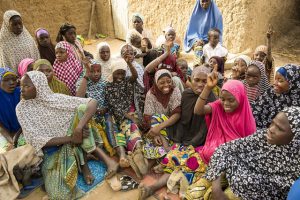by Mehreen Quadri
According to a UNICEF report from 2013, 23.2% of women in Niger are literate. Factors such as culture, family and societal pressures, and the fact that Niger’s economy relies heavily on agriculture, perpetuate some of the highest rates of illiteracy and the lowest rates of formal education in Africa.
Most families in Niger would rather have their daughters contributing to the household than attending school. Throughout West Africa, the burden of supplying water for the household falls to the women and girls. If there is no well in the village, this chore can occupy much of the day as the closest water source may be miles away.
A woman’s lack of education affects the country’s economy, her perceived self-worth, and the future of her own family. According to Dollar & Gotti 1991, a woman’s education can lead to a .3% increase in GDP. SAFE Schools, Mercy Corps. and other NGO’s in Niger have built schools that bring in an average range of 20 to 30 students to the more rural areas where the nearest school is inaccessible. This serves as a great advantage for these girls, but the retention rate is still low. In an agrarian society, families feel that a formal education cannot help with the work required by an agricultural lifestyle nor with their household duties as wife and mother. Furthermore, when girls are sent to a high school, families report that they’re different when they return home. They no longer want to fulfill the traditional roles, bearing the duties of wife, mother, and maintainer of the household. What families might not realize is that education can give a woman more economic power. According to Amete & Amusa 2010, the more formal education a woman has, the more decision making she has in the farms, which is also correlated to how much farm land she has. In a predominantly agrarian society, this would be highly beneficial.

A group of girls taking part in one of Mercy Corps’ Safe Spaces programs in the village of Baura, Maradi region, Niger, February 2014. In the center is Badariya, the girl whose eagerness for an education inspired the SAFE Schools initiative to help get girls back up to speed so they can enter or re-enter Niger’s schooling system. [Sean Sheridan for Mercy Corps]
For most women, security really is dependent on marriage. Besides marriage being a cultural norm and expectation, it can also be a necessity. If a family is suffering from poverty, they may either pressure their daughter to marry someone rich if that is an option, or they may sell her as a ‘wahaya.’ Wahaya is what they call being a fifth wife. In Niger, a man is legally allowed to have four wives. If a man decides to have a fifth wife or ‘wahaya’, he has chosen to take a woman into his household without marrying her. Thus, she will not have any legal or societal rights. She is essentially a modern day slave. The wahaya will perform all the household work without any pay, be used sexually, and beaten if anything goes wrong. Young girls are either usually sold before the age of fifteen to older men as wahaya because of poverty or they are daughters of women who are also wahaya. This problem is more prevalent in towns where men have a higher economic status and have the ability to provide for a larger household.
Regardless of the reason, the fact is that education is out of reach for the majority of girls in Niger, and the lack of schooling makes them even more vulnerable to the challenges they face. It takes more than just building schools in rural areas (essential as that is) to increase literacy and education. We have to ensure that girls have access to that school. There are many factors that affect access, but one of the most easily addressed is water. If a girl’s village has a well, her water-collecting chores can easily be accomplished before and after school, freeing her from that educational barrier. The societal norms are more intransigent and will take much longer to address, but the first step must be freeing girls from the burden of walking for water.


